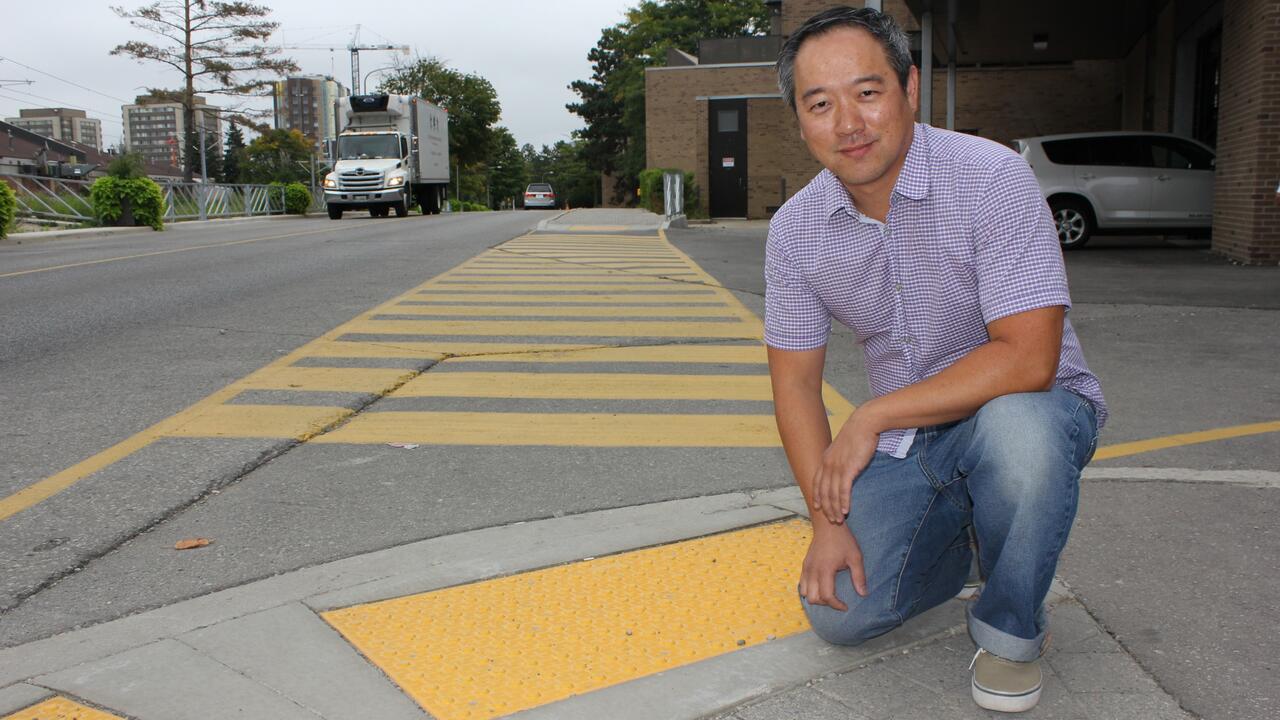
Defying the odds in ‘down and dirty’ manufacturing
From struggling student to successful entrepreneur, Jim Wei shares how his academic experience taught him to take risks and persevere.

From struggling student to successful entrepreneur, Jim Wei shares how his academic experience taught him to take risks and persevere.
By Brian Caldwell Faculty of EngineeringJim Wei (BASc 2000, Mechanical) doesn’t mind admitting that he barely scraped through while earning his mechanical engineering degree 16 years ago.
Learning to persevere, to do what he had to do just to graduate from the challenging Waterloo Engineering program, has been invaluable to him in the business world ever since.
“It’s a very competitive school and you’ve got to compete to survive,” says Wei, who now runs a thriving manufacturing company in Buffalo. “Books are books, they don’t teach you everything, but the environment at UW taught me a lot.”
Despite marks that “weren’t very pretty” and parents who “weren’t too impressed,” his degree landed him a job as a program manager at a Waterloo plant and introduced him to an unlikely love – injection moulding.
Watching machines spit out plastic automotive parts every few seconds - hour after hour, shift after shift, day after day – made a lasting impression on Wei, who was born in Taiwan and raised in Argentina before coming to Canada with his family as an 18-year-old.
“It’s like a legal way of making money, of printing money,” he says.
Wei struck out on his own about five years after graduation, travelling to China to make use of his Mandarin language skills while searching for business opportunities.
First venture led to ‘crazy’ idea
He eventually hit on overseeing the production of injection moulds in China and selling them to Canadian manufacturers at a fraction of their usual price, but it was hardly an overnight success.
Wei lived on rental income from a house he had bought, living in the basement and working part-time in security at a Waterloo nightclub, before signing up his first customer after 18 months of cold-calling.
That venture then led to an improbable pivot into manufacturing during the depths of the 2008 economic collapse.
“People thought I was crazy,” Wei says. “Why are you getting into manufacturing when everybody else is getting out? But it was perfect timing now that I look back because people were selling machines for nothing.”
Working out of space in Waterloo provided by his best friend’s father – a mentor he still calls Mr. Keung – dirt-cheap injection moulding equipment helped him undercut a Chinese supplier of plastic anchors for textured sidewalk tiles, which are common on campus, to assist the blind.
His company, Victory Manufacturing, pumped them out by the millions for a U.S. firm before several factors, including political protectionism and the impending loss of his factory space, prompted Wei to move south of the border himself.
He launched Avanti Advanced Manufacturing in Buffalo in 2011 and now owns two plants totalling 100,000 square feet while employing 12 people, including refugees he connected with through local churches. His efforts earned him recognition last year as one of the city’s 40 Under 40 leaders.
Lower costs in Buffalo ‘shocking’
Cheaper real estate, electricity, property taxes and labour are key to the company’s continuing ability to defy the odds and succeed against overseas competitors in old-school manufacturing.
“It’s day and night, not even comparable,” Wei says of the cost differences between Buffalo and Waterloo. “It’s a shocking truth. I should have done this a long time ago.”
Spending his weeks in Buffalo and his weekends at home in Waterloo with his supportive wife and their two children, he still gets out on the production floor to complete orders in a pinch and aims to build to a 24-hour operation.
One of the products Avanti makes is an anti-slip, glow-in-the-dark nose for stairs that has huge potential as more jurisdictions make such features safety requirements under building codes.
“I just want to see how far I can get with manufacturing,” says Wei, who prides himself on designing efficient production processes. “Slowly but surely – I’m not in a rush. It’s all gradual, organic growth that I envision.
“This is down and dirty. There is nothing pretty about it, but it’s my bread and butter. It’s where I started and I still love it.”

Read more
How Doug Kavanagh’s software engineering degree laid the foundation for a thriving career in patient care

Read more
Upside Robotics secures new funding to accelerate the future of sustainable farming

Read more
Redefining capstone learning by bringing students, faculty and community partners together to tackle real-world challenges
The University of Waterloo acknowledges that much of our work takes place on the traditional territory of the Neutral, Anishinaabeg, and Haudenosaunee peoples. Our main campus is situated on the Haldimand Tract, the land granted to the Six Nations that includes six miles on each side of the Grand River. Our active work toward reconciliation takes place across our campuses through research, learning, teaching, and community building, and is co-ordinated within the Office of Indigenous Relations.